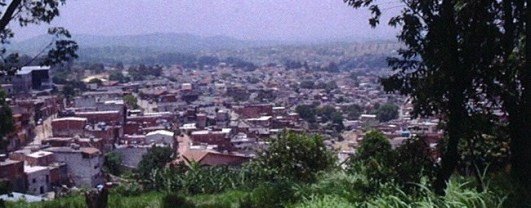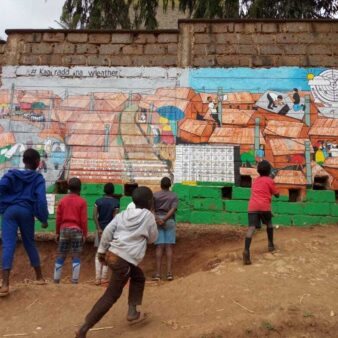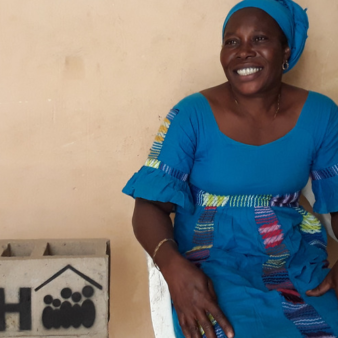Project Description
Aims and Objectives
- To improve the quality of life of informal settlement residents by improving the urban environment and transferring the ownership of the plots of land to the families, reducing vulnerability and ensuring access to credit and secure land tenure.
- To combine the regularisation and urban upgrading process with improvements in other areas such as health, education, environmental preservation and income generation.
- To promote community organisation and participation through the formation of residents’ associations, cooperatives and women’s groups, developing a model for conflict resolution and keeping the community at the centre of the process.
Background
The intense process of urbanisation that has occurred in Brazil in the last three decades has not been accompanied by compatible public policies, and the supply and production of affordable housing has not been sufficient to meet the demand of the low-income population. As a result, families began to occupy empty public and privately-owned land, without access to basic infrastructure and services, often in areas of high risk or environmental preservation. This has not only led to disordered growth but also generated conflict and exacerbated social inequalities. Without secure land tenure, families are faced with the threat of eviction, yet are unable to afford mortgage loans or obtain access to credit in the formal market.
Historically, the public power has not had the capacity to resolve the issue of urban informality at the scale required, particularly with regard to private land that has been occupied by low-income families. The lack of continuity of government policies and action, conflicting political interests and the amount of resources required to regularise or reintegrate the possession of these properties have made it all but impracticable for the State to successfully address these complex urban, social and environmental issues.
About Terra Nova
Established in 2001, Terra Nova Regularizações Fundiárias, Ltd. is a private-sector company that works to secure land tenure for families living in informal land occupations on privately-owned land for up to 15 years. It is the first organisation of its kind in the country and is responsible for the direct negotiations between landowners and residents currently under threat of eviction, working only in cases where a judicial order of reintegration of possession in favour of the landowner has been issued. In this way, the State is not required to go through the typical, costly process of expropriating the land, paying compensation to the landowners and collecting repayments from the community in instalments, allowing the government to use its resources instead for urban upgrading and infrastructure provision.
Land Tenure Regularisation and Urban Upgrading
This project involves land tenure regularisation and the upgrading of informal settlements through an innovative partnership between residents’ associations, government agencies and the private sector. Terra Nova works to negotiate land tenure agreements between informal settlement residents and private landowners, providing a more efficient, cost-effective way of regularising informal occupations in conflict situations in comparison to the current government-run process that is expensive, time-consuming, bureaucratic and inefficient. The intention is to keep families on the land they have occupied, making affordable monthly payments (typically US$15-40 per month for five to ten years). Families with little or no income who are unable to make the repayments are allowed to remain on the land through a special contract negotiated with the owner. Families living in high-risk areas are relocated to a safer place within the area/community or can choose to receive compensation for their house. As its fee, Terra Nova receives a percentage of the value of the sale from the landowner and a percentage of the repayments made by residents to cover legal costs, technical designs, supervising the upgrading process, managing repayments and conflict resolution.
The demand for the services of Terra Nova comes in some cases from the local communities, in come cases from the private landowners and in others from local and state government agencies. The stages involved in the process include mapping of the area, feasibility studies, judicial agreements, development of urban upgrading plans, environmental project and analysis and socio-economic analysis, followed by community mobilisation and training, administration, implementation and management. A range of tools and legal instruments are used during the regularisation process, depending on each particular case. A technical committee has been established as a decision-making body, comprised of representatives of the community, government agencies and Terra Nova, and urban upgrading is carried out by the government with technical assistance from the organisation.
Covering costs
The dissolution of the conflict happens through a Judicial Agreement between the landowners and the residents that establishes monthly instalments for a stated period, which in the end indemnify the landowners and regularise the area. In some cases, the urban upgrading process is carried out and funded (or co-funded) by the local government.
The total payment received by Terra Nova for each project ranges from 15 to 40 per cent of the total amount received by the landowner as compensation from the residents that have occupied the area – a favourable deal for the owner, given that the land had been considered practically lost prior to the intervention. Approximately six months after the process is initiated, Terra Nova begins to receive the first monthly payments: a percentage agreed with both parties for managing and implementing the project. Value added by communities (e.g. the community construction of community facilities, infrastructure, etc.) is taken into account during the negotiations – as is the argument that in some cases, had the land not been occupied it would be worth more to the owner today. In the end, both sides must compromise and Terra Nova plays a mediating role in negotiating an agreement between the parties.
Through a new agreement currently being developed with the ABN-AMRO bank, the residents’ monthly payments will be collected by the bank and the corresponding amounts passed on to the owner and Terra Nova. Part of these funds will be deposited into an Urbanisation and Environment Compensation Fund, which will be reinvested in the area in the form of improvements for the community. The management of the fund will be made by a managing council elected by the community.
Impact
To date, Terra Nova has negotiated land tenure agreements in 17 areas in the state of Paraná, benefiting 6,592 families. New projects are currently underway in the cities of Brasília, São Paulo and Rio de Janeiro, involving an additional 15,528 families in 11 informal settlements, for a total of 22,120 households benefited to date.
Empirical observation demonstrates a substantial improvement to residents’ quality of live in several aspects: reduction in unemployment rates; reduction in incidences of illnesses and violence; improved professional qualification, particularly among women; improvement and expansion of homes; organisation and mobilisation of families.
The approach developed by Terra Nova makes room for private companies and organised civil society in a space traditionally occupied by the public sector, redefining the role of the State in the process. Municipal governments in Paraná, São Paulo and Brasília are currently working in partnership with Terra Nova to develop new legislation that will create a framework for the transfer of the approach by establishing the role of a new kind of organisation – that of a ‘Social Regulator’ or regularising agent – to pave the way for other organisations to follow in the steps of Terra Nova.
Why is it innovative?
- Terra Nova is the first organisation of its kind in Brazil.
- The project provides an efficient, cost-effective approach to regularising informal land occupations and resolving conflict, offering a successful example of the role the private sector can play in land regularisation and urban upgrading processes.
- The project does not require public funds, but rather works through an innovative partnership between communities, government agencies and the private sector.
What is the environmental impact?
Locally-sourced building materials are used in the physical upgrading projects and construction of community facilities. The spatial configuration of the communities is maintained to a large extent, carrying out physical improvements whilst making use of existing community buildings, homes and infrastructure.
In each case, Terra Nova works with the community to preserve areas of environmental protection and develop an environmental education programme. Solid waste recycling, the planting of trees and the development of urban agriculture are encouraged and mechanisms are created to increase environmental awareness and allow for these projects to be carried out.
Is it financially sustainable?
The participation of the private sector ensures the continuity of the projects, even where there is a lack of continuity in terms of government action and support. The project does not require public funds and residents are able to make affordable monthly payments for land, loans for home improvement and services.
The project allows families living in informal settlements to acquire the land they have occupied and carry out improvements to their community through affordable monthly payments of US$15-40, depending on the size of the plot of land. In addition, families taking part in the project, who would not normally have access to formal credit systems, are able to access loans of up to US$4,000 for home improvement from the CAIXA Federal Development Bank through a special agreement negotiated by Terra Nova.
Repayment rates are approximately 80 per cent, nearly four times higher than what other public programmes aimed at the same range of income have been able to achieve. Families who are unable to make the repayments are able to negotiate an agreement via the Technical Committee, allowing them to remain on the land under special conditions, with security of tenure, until they are able to afford the repayments. Families who are unwilling to pay and/or take part in the process are then subject – on an individual basis – to the original judicial order of reintegration of possession in favour of the landowner. The aim of the project, however, is to ensure that families are able to stay on the land that they occupy and that new agreements and negotiations can take place. No families have been forcibly evicted to date.
What is the social impact?
The project respects the spatial configuration of the community and works to keep families on the land they have occupied, preserving existing social networks. Through seminars, workshops and assemblies and day-to-day activities, the project works to mobilise and strengthen the community, encouraging a prioritisation of collective interests above individual ones.
A range of workshops and seminars are carried out for leadership development, the formation of women’s groups and income generating activities and the upgrading process is managed by the local community with technical assistance and supervision from Terra Nova.
Land titles are issued in the name of the woman where possible, as women and children tend to be particularly vulnerable in cases of separation between couples or in cases where the man decides to sell the land. The project does not impede the residents from selling their homes and land once the regularisation process is complete; it does, however, require both spouses (in the case of a couple) to sign the transfer contract.
Barriers
- Bureaucracy and a lack of understanding of the land regularisation process within local and state government agencies – in addition to the lack of continuity resulting from changing administrations – has led to delays in the process of project approval and the issuing of permits and environmental licenses in some cases. Terra Nova has worked to establish strong partnerships with public agencies to minimise delay.
- Particularly in the initial stages, some residents are sceptical about the legitimacy and credibility of the process. This occurs particularly in areas where other lawyers have previously attempted to regularise the area without observing the correct procedure and/or where politicians have made promises that are impossible to fulfil. Terra Nova has worked to build trust through good communication and action and local government support of the process has helped to increase the confidence of residents.
- In some municipalities, Terra Nova has had to struggle with a belief on behalf of government agencies that the problem of urban informality can only be resolved by the public sector, as private initiatives are only concerned with profit, despite the fact that historically the public sector has not had the capacity to deal with the problem. Over time, Terra Nova has demonstrated the effectiveness of the approach and obtained the support of government agencies.
Lessons Learned
- In order to effectively address issues of urban informality through land regularisation policies, it is necessary to have a strategy for the prevention of new informal settlement development. Relevant policies and planning tools, the provision of affordable housing options for low income families and mechanisms to create jobs and income are essential.
- It is important to create a governmental body made up of the various agencies involved in the process to address the issue with the necessary level of detail and agility.
- The acceptance and involvement of the population in the process is directly linked to the strength and degree of organisation of the residents’ association. The formation and training of community leaders is an important factor not only to ensure successful implementation but also for the establishment of sustainable post-project self-management mechanisms.
- The establishment of the Technical Committee that residents can turn in order to resolve conflict or address a difficult situation – which had often not been foreseen in the original negotiations – has been key to the success of the project.
Evaluation
Terra Nova regularly conducts environmental impact assessments and a comprehensive post-occupancy evaluation with residents is due to be carried out. In addition, following a recommendation by the World Bank, an evaluation of the experience is currently being carried out by researchers at the University of California.
Transfer
From 2001 to 2006 Terra Nova carried out 17 projects in four municipalities in the state of Paraná, involving 6,592 families. With new projects currently being developed through newly associated offices set up in Rio de Janeiro, São Paulo, Porto Velho and Brasília, this number has increased to 22,120.
Through an agreement with ABN-AMRO in which the bank will make the total amount required for the development and implementation of each project immediately available to Terra Nova, the company plans to expand its activities to all 26 states within the next five years. In partnership with ABN-AMRO and the International Financial Corporation (IFC) of the World Bank Group, Terra Nova is developing a Corporate Governance Programme to consolidate the process and allow the approach to be scaled up in a sustainable manner.
This is a highly innovative approach within the context and has received a great deal of interest both locally and nationally – from governments, other private sector organisations, NGOs and community groups. Whilst different countries and contexts have different legal frameworks and practices when it comes to land tenure regularisation, the successful implementation of the project is an issue of methodology rather than legislation, making this a highly transferable approach both nationally and internationally.



